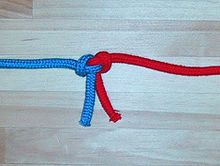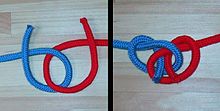| Butterfly Bend | |
|---|---|
 | |
| Names | Butterfly Bend, Strait bend [1] |
| Category | Bend |
| Related | butterfly loop, Hunter's bend, Zeppelin bend, Ashley's bend |
| Releasing | Non-jamming |
| Caveat | Errors in tying can result in a similar looking but insecure bend |
| Instructions | [1] |
The butterfly bend is a knot used to join the ends of two ropes together. It is the analogous bend form of the butterfly loop, [1] in that it is the butterfly loop with the loop cut. [2] The observation that the butterfly loop is secure enough to isolate a worn or damaged section of rope within the loop indicated that the bend form of the knot would be similarly secure. [3]
History
When Phil D. Smith made the first known presentation of the Hunter's bend in 1953 (under the name "rigger's bend"), [4] he described it as a modification to the butterfly bend. [3] While the bend form had been known to mountaineers, nautical rigger Brion Toss brought the knot to a wider audience when he published it in 1975. Unaware of the earlier publication, Toss called the butterfly bend the strait bend after the Strait of Juan de Fuca. [1] [5]
Tying
The butterfly bend can be tied using a subset of the methods used for tying the loop form by holding the two rope ends together and treating them as if they were a single bight. However, specific methods have been developed for tying the bend form directly, including the one shown below and characterizable using the mnemonic device "A d through a b; 'twist the two and toward me":

Security
A properly tied butterfly bend should be as secure as the equivalent loop form. [1] However, subtle positioning errors during the above shown tying method can result in a similar looking but insecure bend knot. [6]
See also
References
- ^ a b c d Toss, Brion (1998), The Complete Rigger's Apprentice, Camden, Maine: International Marine, pp. 72–73, ISBN 0-07-064840-9
- ^ Budworth, Geoffrey (1999), The Ultimate Encyclopedia of Knots, London: Hermes House, p. 77, ISBN 0-681-60694-0
- ^ a b Smith, Phil D. (1955) [1953]. Knots for Mountaineering, Camping, Utility, Rescue, etc. Twentynine Palms, CA: Desert Trail.
- ^ Budworth, Geoffrey (1985) [1983], The Knot Book, New York: Sterling Publishing, p. 120, ISBN 0-8069-7944-5
- ^ Asher, Harry (1989), The Alternative Knot Book, London: Nautical Books, p. 57, ISBN 0-7136-5950-5
- ^ "Butterfly Bend". Notable Knot Index. Retrieved 2012-05-27.